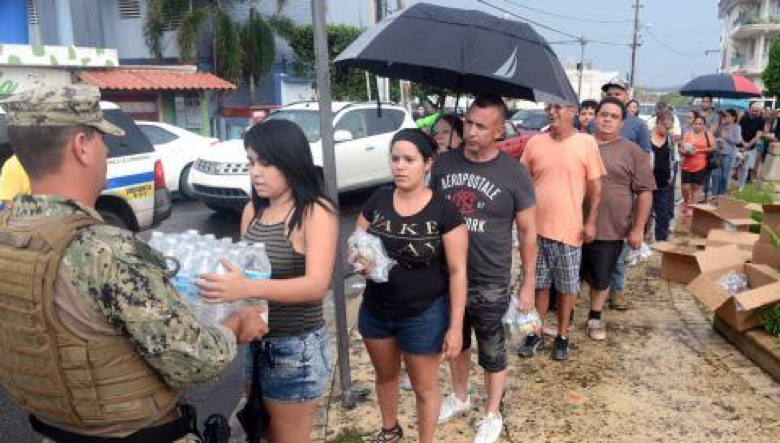Losing Our Cool: Climate Change Spurs Global Increases in Violence and Inequality

Puerto Rican citizens waited in long lines for food and water after Hurricane Maria wrecked the island’s fragile infrastructure. Photo: U.S. Department of Homeland Security
By Annie Roth
SAN FRANCISCO—We all know climate change increases the severity of tropical storms, but what about Twitter storms?
According to Solomon Hsiang, director of the Global Policy Laboratory at the University of California, Berkeley, climate change is destabilizing both economies and emotions across the globe.
During an eye-opening lecture titled “Economic Inequality, Violence, and Life in a Changing Climate” on 28 October at the World Conference of Science Journalists 2017, Hsiang warned the audience that climate change is heightening violence and worsening economic inequality around the world.
Rising temperatures affect suicide rates among farmers in India and the amount of cursing on Twitter.
Hsiang studies the economic and societal impacts of climate change; his findings inform international public policymakers. His latest research on the links between climate and conflict suggests that rising temperatures affect everything from suicide rates among farmers in India to the amount of cursing on Twitter.
Hsiang’s forecasts are influential. For instance, his team’s 2012 analysis of the economic impacts of hurricanes informed several aspects of the Obama administration’s climate change policy. His latest research focuses on two key relationships.
Temperature and violence
Many scientific studies have linked aggression to high temperatures. One study showed that the hotter it got, the longer other drivers would honk their horns at researchers blocking traffic. Another study found the likelihood that a police officer will fire on a simulated intruder increased as temperatures rose. A graduate student in Hsiang’s lab even found a correlation between temperature and the number of curse words people used on Twitter.
These small-scale studies prompted Hsiang to wonder how a global shift in climate might affect the stability of societies around the world. To address that question, Hsiang and his team examined the relationship between El Niño events and civil wars.
During El Niño years, climatic conditions in the equatorial Pacific Ocean temporarily shift from wet and cool to hot and dry. In those years, the researchers found, the rate of new civil wars doubled in nations throughout the affected region.
Climate change and inequality
Climate change disproportionately affects the poorest and most vulnerable communities, Hsiang said. Storms are one of the clearest examples.
Studies show that the frequency and severity of tropical storms has increased dramatically over the last century. “There are few things on the planet besides nuclear weapons that destroy value faster than hurricanes,” Hsiang stated. When super storms makes landfall, they set off localized economic depressions that communities may never fully recover from.
"For the 15 years after a storm, economic growth slows down."
“When you look around the world and you look at economic performance after cyclone strikes,” said Hsiang, “you see that for the 15 years after a storm, economic growth slows down and eventually it goes back to the same trend line but it never catches up.” For example, when Hurricane Maria struck Puerto Rico in September, Hsiang estimates that it washed away 26 years of economic development on the island.
Hsiang predicts rising temperatures will also exacerbate economic inequality across the mainland United States. In a study published in the 30 June 2017 issue of Science, his team explained how increasing violence, flooding, disease and decreasing economic productivity will make Southwestern communities poorer and Northeastern communities richer. Hsiang called this confluence “the largest transfer of wealth that may ever occur in the United States.”
Low income communities suffer disproportionately from climate – could be larges wealth transfer in US history #climateinequality #WCSJ2017 pic.twitter.com/UgCtzKTqGN
— Bennett McIntosh (@WordsByBennett) October 28, 2017
His latest economic forecast, which he debuted at WCSJ2017, projects that high temperatures alone will cost the United States $6.7 trillion over the next century. He argued that early investment in clean energy systems and infrastructure can help communities avoid the most severe impacts of climate change.
—
Annie Roth is a freelance journalist based in Santa Cruz, California, and a graduate student in the UC Santa Cruz Science Communication Program. She uses journalism to put a spotlight on marginalized conservation issues. Follow her on Twitter @AnnieRoth_atSea
